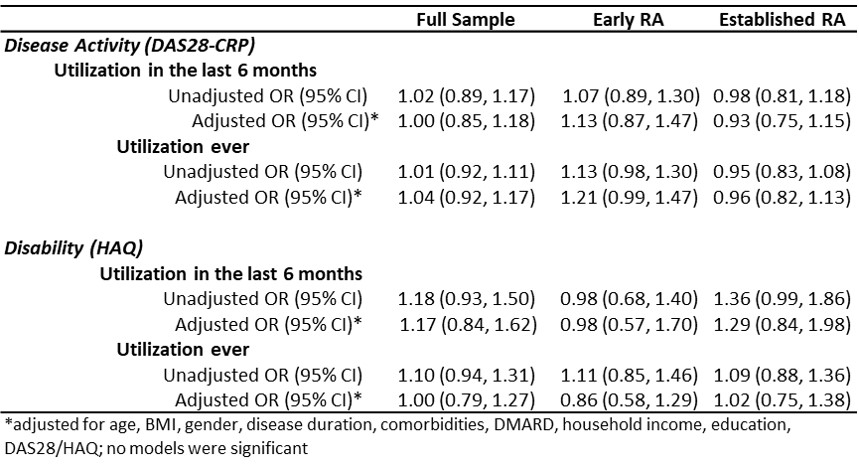Session Information
Session Type: Poster Session B
Session Time: 9:00AM-11:00AM
Background/Purpose: Considerable advances in pharmacological care for adults with rheumatoid arthritis (RA) over the last 25 years have reduced disease activity in individual patients, but disability has not improved to the same extent. Rehabilitation, including physical therapy (PT) and occupational therapy (OT), is recommended to address disability and functional limitations, yet utilization of rehabilitation for adults with RA in the United States is low. Reductions in RA disease activity and disability are associated with utilization of rehabilitation services in Caucasian adults with RA, but it is unclear if associations are similar in African Americans. Thus, we examined the association of disease activity and disability with rehabilitation utilization in African Americans with RA.
Methods: We analyzed baseline data from the Consortium for the Longitudinal Evaluation of African Americans with RA (CLEAR) I Registry (disease duration < 24 months) and the CLEAR II Registry (any disease duration). Data were collected in a single visit for each participant at one of four southeastern US institutions. The clinical variables of interest were disease activity, defined by the Disease Activity Score 28 with C-Reactive Protein (DAS28-CRP), and disability, measured with the Health Assessment Questionnaire (HAQ). Rehabilitation utilization variables were self-reported recall of PT or OT in the prior 6 months (yes/no) and any prior PT or OT utilization (yes/no). We examined the association of disease activity and disability with rehabilitation utilization using separate binary logistic regression models to estimate odds ratios and 95% confidence intervals. We adjusted for age (years), sex, body mass index (BMI, kg/m2), disease duration (months), use of disease modifying anti-rheumatic drugs (DMARD; yes/no), comorbidities (number), household income ( >$30k vs. ≤$30k), and education (more than high school vs. high school grad or less). We repeated the analyses with the sample stratified by disease duration: early RA and established RA.
Results: Of 1067 participants, 14% reported utilizing rehabilitation in the prior 6 months, and 41% reported ever utilizing rehabilitation (Table 1). Rehabilitation utilization in the prior 6 months was similar among those with early and established RA (13% vs. 15%), but a greater proportion of those with established RA reported any past rehabilitation utilization (31% vs. 48%). Disease activity and disability at the time of baseline visit were not associated with rehabilitation utilization in the past 6 months or ever, in unadjusted and adjusted models (Table 2).
Conclusion: Among African Americans with RA, rehabilitation utilization was low (14%) in the 6 months prior to enrollment into CLEAR, and was not associated with disease activity or disability level. Factors driving rehabilitation utilization in African Americans with RA, as well as success in reducing disease activity and disability, are unclear, and should be a focus of future research to facilitate delivery of appropriate and effective rehabilitation services.
 Table 1. Participant Characteristics
Table 1. Participant Characteristics
 Table 2. Association of disease activity and disability with rehabilitation utilization
Table 2. Association of disease activity and disability with rehabilitation utilization
To cite this abstract in AMA style:
Thoma L, Cleveland R, Bridges S, Jonas B, Callahan L. Disease Activity and Disability Are Not Associated with Rehabilitation Utilization in African Americans with Rheumatoid Arthritis [abstract]. Arthritis Rheumatol. 2020; 72 (suppl 10). https://acrabstracts.org/abstract/disease-activity-and-disability-are-not-associated-with-rehabilitation-utilization-in-african-americans-with-rheumatoid-arthritis/. Accessed .« Back to ACR Convergence 2020
ACR Meeting Abstracts - https://acrabstracts.org/abstract/disease-activity-and-disability-are-not-associated-with-rehabilitation-utilization-in-african-americans-with-rheumatoid-arthritis/
